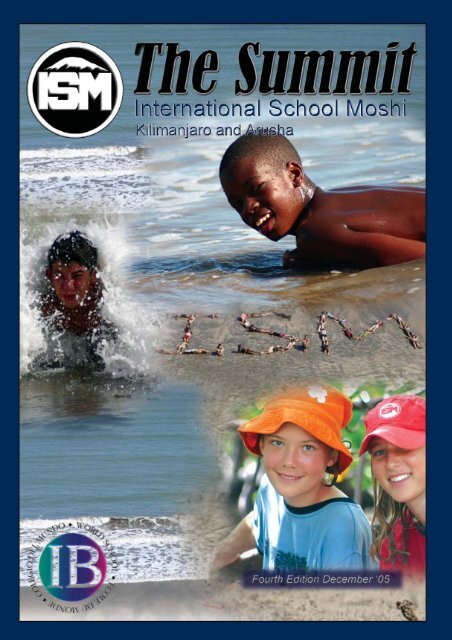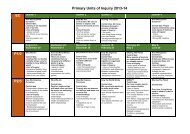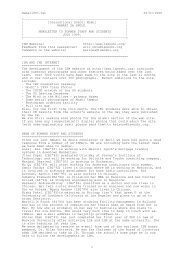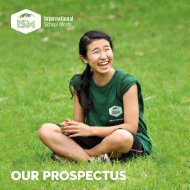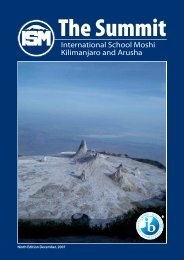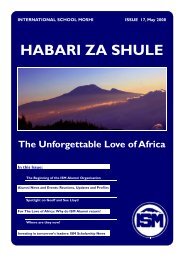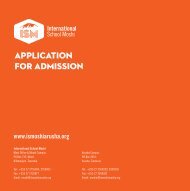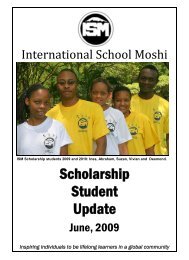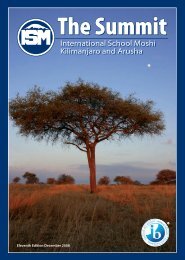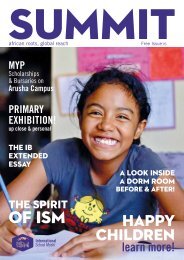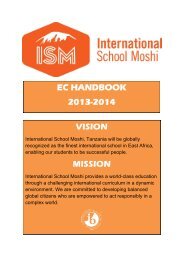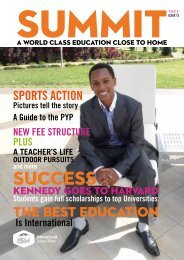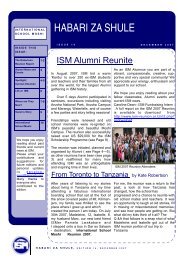Summit Magazine December 2005 - International School Moshi
Summit Magazine December 2005 - International School Moshi
Summit Magazine December 2005 - International School Moshi
- No tags were found...
Create successful ePaper yourself
Turn your PDF publications into a flip-book with our unique Google optimized e-Paper software.
Dear ParentsWelcome to the fourth edition of The <strong>Summit</strong>magazine. We have added pages to this edition andwe are inviting parents with businesses to advertisein the magazine to help us afford to produce it. Thisis a great way to support your school. Term one ofthe <strong>2005</strong>-06 school year has been another blur ofactivity on both campuses.Several OP Tripstook place in Termone, including thesouth circuit onKilimanjaro, a tripto the base ofMawenzi, a climbon Mount Meruand a camp crafttrip to Marangu.Mr. Wiggins andMs. Spears havecreated another excellent menu of activities for ourstudents. The IB Hard Labour trip to build aclassroom in the Kilimanjaro village of Materuni wasalso a great success. With the foundations dug andset, students plan to return to lay the more than200 bricks they made and see the new classroomslowly spring to life. We are working on ourcommunity service efforts at the school and SandraRiches is leading the way this year as CASCoordinator in <strong>Moshi</strong>.In <strong>Moshi</strong>, we opened the renovated Kijana boardinghouse and Richard Eaton, our new Head ofBoarding, has redesigned the boardingprogramme. ISM became the first internationalschool in Africa to join The Association of Boarding<strong>School</strong>s (TABS) in the United States and we plan todraw on the collective expertise of TABS to steadilyimprove boarding at ISM. One very successful eventwas a sporting gala that saw 52 Arusha studentstravel to <strong>Moshi</strong> to compete in swimming, cricket,volleyball and netball. The competitors stayedovernight and enjoyed a Halloween disco in <strong>Moshi</strong>.As one school, we are making a big effort this yearto promote cross-campus events.Teachers have been very busy working on theAccreditation Self-Study report for the Council of<strong>International</strong> <strong>School</strong>s (CIS). ISM will receive avisiting team of inspectors from CIS in May who willevaluate our school. I want to thank all parents,teachers and students who have participated on themany committees required for this process duringthe past year. I especially want to thank everyonewho gave us comments on the Philosophy andObjectives of the school as we seek to ensure thatthey are relevant for ISM today. Our Primaryteachers have also been preparing for our PYP preauthorizationvisit from the IBO in January. Iappreciate all these efforts because they are allaimed at making ISM a better school.We finally installed our new playground equipmenton both campuses and I am pleased that thechildren have better structures to play on. We alsoinstalled a Public Address system on both campusesthat allows us to have a fire alarm and lock downsystem as well as the facility to makeannouncements through the campuses. We wereable to do this through a generous grant from theU.S. State Department.This space, of course, is not large enough to tell thewhole story of the school in Term one. For that youwill need to read further. This is ISM.Barry SutherlandChief Executive Officer1From the CEOISMc o n t e n t s4Boarding20Outdoor PursuitsSports14THE SUMMIT is produced for ISM by SILICON VENTURES. Theta Lane Court, Theta Lane, Off Lenana Road, KilimaniP.O. Box 6936-00300 Nairobi, Kenya. Tel: 254 (20) 2 712 943, (254) 722 258614 Fax: 254 (20) 249 363 Email: silvenken@swiftkenya.com
4Boarding LifeI’ve got my eye on you!Extreme Sport "Paint the halls with…"Paintball is an extreme sport that is growing in popularity. However, inEurope and North America, the sport is played using special guns.However, in an African setting there's only one-way to play: with the'Manati' (Swahili for slingshot!).This term students learned how to shoot and repair traditional Africanslingshots. They were then invited to advance their skills by playingnumerous paintball scenarios. "Pictures," as the age-old-adage goes,"are worth a thousand words." We hope you enjoy ours of this specialboarding activity…Richard EatonArmed and dangerous. Revenge at last! He got me!Five Pillars of BoardingISM> Respect > Communication > Environment > Community > ResponsibilityRules. They arenecessary. They areeverywhere.Boarding is noexception. Rules arepart of life. It's10.15 pm andmusic is blastingout of a boardinghouse; it's 12.30pmand a student isshopping at a localmarket wearingclothes that areinappropriate. Bothstudents will beheld accountable.Why shouldn'tmusic be playedloudly after 10.15?Why shouldn't onebe able to wear theclothes they thinkdefine them as anindividual? Ofcourse, such issuesare not unique toboarding schools.In one form oranother they areencounteredwherever societieshave been formed.<strong>International</strong> <strong>School</strong><strong>Moshi</strong> is a boardingschool, but for thepurpose ofexplaining how weenforce and upholdrules, it might makemore sense to referto ourestablishment as a'residentialeducation facility.'We overcome theaforementionedproblems byrelating all rulesand regulations towhat we call "TheFive Pillars ofBoarding." They arewhat we as aschool believe to bethe essence ofhuman decency.The Five Pillars are:Respect,Communication,Environment,Community, andResponsibility. Allof our rules andregulationsultimately referback to these ideas.These pillars applyto staff andstudents alike. Wehave regular Houseand BoardingCouncil meetings asforums in which weas a staff andstudent body candiscuss how far weare actualising ourpillars. We believethat our Five Pillarsare universal; theyunderlie allcultures, religions,and peoples. Theyare the baseline ofdecency that setsus aside as humanbeings. It is abaseline that weare determined tomaintain."Boarding" at ISM isnow more thanboarding. It'seducation for alifetime.Chris Folland(ResidentialBoarding Parent) &Richard Dean Eaton(Head of Boarding)
The Truth About BoardingBy Richard Eaton-Head of BoardingWhat is the truth about boarding schools?<strong>International</strong> <strong>School</strong> <strong>Moshi</strong> (ISM) has been at theforefront of boarding education in Tanzania since1969. We were the first school in Africa to offerthe prestigious <strong>International</strong> BaccalaureateDiploma course, and now I am proud toannounce that we are the first institution in Africato be granted membership in TABS!TABS stands for 'The Association of Boarding<strong>School</strong>s.' It is a well-known organization thatunites boarding schools around the world. Itseeks to promote an awareness of the advantagesthat boarding schools offer, while annuallyhosting conferences that facilitate best practicesin residential (boarding) education. To beadmitted into the TABS family a school mustdemonstrate that they are committed toexcellence in every respect. ISM has earned theright to be part of this family and I am very proudto be leading the boarding team at this excitingcrossroad.What are the advantages of boarding schools?More boarding school graduates achieve topmanagement positions by mid-career than theirpublic and private day school peers. 87% ofBoarding school graduates report they feelacademically prepared for college, compared to71% of private day school grads, and 39% ofthose who receive a public school education.Boarding school students report spending moretime academically engaged outside of school andthey also cite their schools as more academicallychallenging. All of this in addition to statisticalevidence suggesting boarding school studentshave more opportunities to gain meaningfulleadership experiences while in school suggeststhat the residential educational experience issecond to none (for further statistical insight intothe advantages of a boarding school educationsee the TABS website: www.schools.com).Card MakingSee what I made!It's lots of work.Manati WalkI’m sending one to youThis is fun!5Boarders At Work And PlayISMWhat is exciting for Tanzania and Africa is that wehave the opportunity to offer such an educationto students in the <strong>Moshi</strong>/Arusha region andbeyond. <strong>International</strong> <strong>School</strong> <strong>Moshi</strong> has been aleader in the awarding of scholarships toTanzanian children and we have an excellent trackrecord when it comes to placing Tanzanianstudents in major colleges and universities in theUnited States and Europe (some on full academicscholarships). As we continue to grow we willdraw attention to the youth of this country and tothe local community.Aim high, shoot low.I hit the target!
6Scholarship StudentsISMISM Scholarship ProgrammeThe scholarship programme at <strong>International</strong> <strong>School</strong><strong>Moshi</strong> confirms ISM's commitment to the widercommunity. It supports the school's beliefs and valuesthat state, "We are a school in <strong>Moshi</strong> and Arusha, inTanzania, in Africa. We have a clear commitment toadvancing the welfare of this community, this nationand this continent."The scholarship programme is aimed at students inselected Government Secondary <strong>School</strong>s in theKilimanjaro and Arusha regions. Outside funding hasbeen extended by the valued support of KahamaMining Corporation Limited (KMCL). KMCL is a largemining company based in Kahama District inShinyanga Region. As part of their commitment to thewider community they have agreed to sponsor fourstudents from two government schools in KahamaDistrict.Daniel Mundeva and Mhula Ngassa both joined ISM inJanuary 2004 as students in our S3 class with the aimof taking IGCSE examinations in 2006 and completingtheir <strong>International</strong> Baccalaureate Diplomas in 2008.They are currently enrolled in S5.Both students settled into ISM extremely quickly andare achieving strong academic success competingeasily with the best students in the class. They havealso participated very fully in the life of the school.Both have been part of an African Cultural Studiesgroup and both have joined the Model United Nationsgroup. Mhula has been working on web design andplaying indoor hockey, volleyball, and table tennis.Daniel is more of a football expert and an abledrummer. Both have fully participated in the school'sOutdoor Pursuits programme and recently reachedSocialist Peak on Mount Meru.Catherine Kayila and Leonard John both joined ISMmore recently after completing their Form IVexaminations in Kahama District. They are nowstudying in their second year of the school's<strong>International</strong> Baccalaureate Diploma programme andhope to attain their full diplomas in May 2006.Both have also participated fully in our CAS (Creativity,Action, Service) programme. Leonard is a practicedmusician, and has joined the school choir andundertaken piano lessons. He has also played cricketand volleyball, has learnt Tae Kwan Do, and hasundertaken community service by teaching English toour ancillary staff and visiting children at a nearbyorphanage. Catherine has played both netball andtennis, is learning how to make batik, and hasundertaken many community service activitiesincluding teaching IT skills to students of a nearbyschool, and visiting children both in the local hospitaland at an orphanage.Catherine KayilaDaniel MundevaLeonard JohnMhula Ngassa
MYP: What's it all about?Presently the staff and board of ISM are considering the addition of the <strong>International</strong>Baccalaureate Middle Years Programme (MYP) to our school. The <strong>International</strong> Baccalaureateprogramme is now taught in nearly 2,000 schools worldwide and it is recognized as the mostglobally accepted curriculum for students moving between countries. As educators weconsider the three IB programmes (PYP, MYP, IB) to have well-articulated philosophies andfundamental principles. All three are broad-based, balanced and holistic. They encouragestudents to be independent learners, to develop international perspectives, to engage incritical thinking and to get involved in service to the community.As teachers we are currently addressing the challenge of translating rigorous academicexpectations into manageable classroom assignments that are well-defined by objectives,reflections, and assessments. At the same time S1 and S2 students are being introduced to anew way of learning and assessment, discovering that there are natural links between theirsubjects.What are the fundamental characteristicsof the MYP?In the MYP, studentsfollow a balancedprogramme, studyingeight traditionalsubjects as well asengaging inIndependent Study.Throughout thesesubject areas, there isan emphasis on suchfundamentalMYP fun!characteristics asCritical Thinking,Intercultural Awareness, Holistic Educationand Communication.Theory of Knowledge. Both are central andintegral elements of the respectiveprogrammes.What is the Personal Project?In order to receive the Certificate, S5 studentsmust complete a major independent project.The Personal Project may take the form of anessay, a multimedia presentation or an artisticproduction, and should demonstrate whathas been accomplished in Approaches toLearning and at least one other Area ofInteraction. Students take great pride andenjoyment in doing these projects; withfreedom to explore topics of their choice ingreat depth and detail, they become expertsin their fields.7I B M i d d l e Y e a r s P r o g r a m m eISMWhat is the structure of the Middle YearsProgramme?Because the development of the student isthe focus of the MYP, the student appears atthe centre of the curriculum model.Surrounding the student are five Areas ofInteraction: common themes used within theacademic subjects. The Areas of Interactioninclude:> Approaches to Learning: Learning how tolearn and to excel at the learning process.> Community and Service: Learning to helpothers.> Health and Social Education: Learningabout human health and society.> Environment: Learning to protect thenatural world.> Homo Faber: Learning to design andcreate.It is important to note that there aresignificant and intentional links between theMYP Areas of Interaction and the IB diplomaWhat is the pathto the IBCertificate?Students worktowards the MYPCertificate whichincludes externalmoderation by theIBO of the school'sinternalassessment. S5Why move?work is judged byan internationalcommittee who, if they deem the students upto standard, award the certificate. To receivecertification, students must achieveacceptable scores, have participated in theprogramme for at least the final two yearsand have met the school's expectations ofcommunity and service.Steve BrownMYP Coordinator Arusha Campus
S e r v i c eAmani Street ChildrenMkombozi Rugby9The centre provides a home for children aged 3 to17. Someare orphans, some are abandoned, some have been sold bytheir parents for prostitution and so on. The students fromISM try to interact with them, play games, football, draw,talk, listen and teach a bit of English.(Elisa Bloemberg)Upendo OrphanageDay Care Centre Swimming<strong>Moshi</strong> CASOn a Wednesday afternoon,at 3 o'clock, ten to twentychildren from the DaycareCentre come to swim. Therole of the ISM students isto help the childrenovercome their fear of waterand hopefully learn to swim.Each of the ISM students isresponsible for two of thechildren and they playvarious games with themincluding jumping into thepool and swimming racesacross the pool. (Lucy Hills)ISMH a r d L a b o u r"As part of the ISM CAS programme our IBstudents are encouraged to join in HardLabour weekends, which usually involvegoing into the local community andworking with the villagers to help buildbridges, lay floors, mend troughs, digfoundations, and make blocks forclassrooms, etc.As the name suggests, this activity is not forthe faint hearted or wimpish by nature!Nineteen students went to the village ofMateruni, a very small settlement on theslopes of Kilimanjaro to help repair acollapsed classroom. They set up campoutside the church and after having a niceFriday afternoon playing with the childrenthey thought that the trip wasn't going tobe so hard after all. As you can see, theywere greatly mistaken.by Amandine DeRosnay- student, andSandra Riches - (CAS Coordinator)
A Week at the Beach10S2 C l a s s T r i p : P a n g a n iISMOur school housesits on the clifftop,lulled by thelapping of theIndian Ocean andthe wind in thepalm fronds. It isa far cry from ourhigh altitude basesin <strong>Moshi</strong> andArusha. Its hot,humid andsurrounded by theSwahili culture.The S2 studentshad a busy weekstudying thecoastline, thed i v e r s ecommunities ofthe rockpools andmangroves, theslave trade andthe colonialhistory of thetown.There were plentyof opportunitiesfor good plain funtoo!
Down on the Farm11We are lucky to have a wealth of 'outdoorclassrooms' on our doorstep. Africa's highestmountain provides us with some exciting hands-oneducational opportunities. Our students spent afew days camping at West Kilimanjaro in thebeautiful gardens of Simba Farm which is locatedon the slopes of the mountain. They take a look atdifferent land uses in the area and investigate thepossibilities for tourism and other economicdevelopment. Students have the opportunity to getout and about on the farm and to experiencedifferent farming strategies for themselves.Thanks to the Bruinsmas for their hospitality.Jatropha, a local plant that can be used amongstother things as an alternative to fossil fuels.Cows bred to thrive in our particularenvironmentS 3 C l a s s t r i p : W e s t K i l i m a n j a r oISMArtemesia, a plant whose active ingredient is important in the control ofmalaria.Beans are natural nitrogen fixersRelaxing...
PYP Parent Workshop - Thursday 22nd September, <strong>2005</strong>12I B P r i m a r y Y e a r s P r o g r a m m eISMIt was refreshing and exciting to see parents turn up in large numbers for our first PYPWorkshop of the year. Thirty-two parents attendedthe workshop and they represented approximately 45students from our school, both Primary andSecondary. This was encouraging for our school andteachers, as it provides us with a perfect opportunityto talk to parents about what we believe abouteducation and to explain why we approach teachingand learning with in the ways we do! This thenassists parents in further supporting their children asthey continue to learn and develop in our schoolenvironment.During the workshop, the parents were asked torecord and discuss what they knew about the PYP:This was an opportunity for us to gauge their existingknowledge and to determine what, if any,misinformation may be "out there". During thisactivity the parents wrote the following things:What we Know About The PYP:- inquiry way of learning- gives children confidence- a way of learning in a practical way which relates to your daily life- not so much stress on children- children become open-minded- playing and learning- independence-oriented- develops leadership qualities- investigative education- learning at your own pace- holistic education- makes international people- not just learning to pass standard exams- equalizes children- encourages the child to learn from where he/sheis- listening to the child learn how to learn- pleasure in and from learning- more free thinkers- integration of subjects- more active in class- about building global citizens- transferable programme- child-based, interactive learning- about competencies rather than subjects- respecting diversity- collaborative and participative learning- builds questioning skills- getting children ready for life…not exams- fostering independence and responsibility in learning- relevance to children's livesSO…they knew a great deal already!Thanks you for you continuing support!Natalie Croome(PYP Co-ordinator)
Life On The StreetsSo far this term, the P4 students havestructured their learning around the centralidea that children are a unique part of oursociety and that they have specific rights.Students have discussed the nature of, anddifference between rights and responsibilitiesand demonstrated that they understand thisconcept by sharing ideas to create a list ofrights and responsibilities that they have atISM: the right to learn, to feel safe, to askquestions if they don't understand, to havefun and be happy. They also have theresponsibility to take care of themselves andtheir belongings, to take care of each other,and to ask questions to find out more aboutthe world.In addition to their own rights andresponsibilities, P4 students are learning aboutthe international rights of a child and howthese are applied in different parts of theworld. Specifically, P4 has been preparing fora first-hand investigation of the rights andresponsibilities of street children in Arusha.On Wednesday, 28th September, the P4visited Mkombozi Centre for Street Children toconduct their investigation. In preparation forthe visit, each student wrote questions s/hewould like to ask a street child. After sharingthese questions with the whole class, studentsparticipated in a democratic election to votefor the Top Ten most useful questions to beasked on the visit. Some of the questionselected were as follows:1. What kind of home would you like tohave?2. What do you eat? Is your food healthyfood?3. How do you feel about your life?After visiting with the street children, studentshad time to reflect on their experiencesprivately in their journals, and corporately as aclass. Reflection is an important part oflearning at ISM as it encourages students tothink about their learning and to apply it in apersonal way. Upon return, students sharedand compared responses to questions asked,but one question will remain: How will P4students exercise the responsibility to protectthe rights of street children in Arusha?Sabrina Kassam wrote:P4 went on a field trip to Mkombozi to see thestreet children. We were interested to see theplaces where the children eat, sleep andspend their time. One place was under abridge and another place was a bus stand fullof taxis and cars. Another was where a ladywas selling bread. The child I interviewed wascalled Yusufu. He was funny because he did acartwheel, walked on his hands and then fellto the ground. He did a back flip and thenput his hand out like an actor to the girls.Imran Niskala wrote:There was a boy called Hussein. He was astreet child. He wants a big home that has aTV and a gate. He eats ugali and beans and hehas to sleep at the bus stand. He covershimself with plastic bags. Everyday he findsfood, plays football and prays to God. Hedoesn't have a home.Some answers to the questions:Would you like to go to school?Yes, your school because you are only 8 andyou are in grade 4.What kind of home would you like to live in?An Mkombozi residence.Why do you live on the streets?My mother died and my father marriedanother woman who didn't like me. She hitme and told me I did bad things so I lefthome. I caught a bus from Tanga, when theconductor asked for money I pretended oneof the passengers was my mother.Have you been out of Arusha?Yes, I walked from Babati and slept on theroadside.13P Y P A r u s h a : T h e R i g h t s o f t h e C h i l dISM
14O u t d o o r P u r s u i t s P r o g r a m m eISMKili The Hard Way - Machame RouteVictorious.So far, it's a piece of cake.The Outdoor Pursuits Programmeis a very popular option for bothstudents and staff, with mostaiming to reach the summit ofMount Kilimanjaro. In fact, thelarge majority of those who headoff on the Uhuru Peak tripmanage to reach the top. One ofthe reasons we feel that thishappens is that our students areprepared for the challenges ofthe trip by working their waythrough our comprehensiveprogramme. It starts off with acampcraft trip, where thestudents are taught the basics ofwalking while carrying gear andcamping. They then head on tothe mountains through a series oflevels. Level one is a weekendwalk to the first hut, while levelthree sees students walking up toHorombo Hut at approximately3800m, before heading out onday three to the base of Mawenziat a height of 4600m. Level fouris usually a camping trip on Kili,such as South Circuit, or SocialistPeak on Meru. When a studenthas shown that they can meetthe demands on these trips, theythen can try for the summit atUhuru Peak. Not content withreaching the summit? Manystudents then sign up for “UhuruPeak the Hard Way", where theycamp all the way up.What's so hard about this ?You can lean on me.Nobody said it would be this hard.
Camp Craft Trip15Here's how you set up a tent.Teamwork.Pare Mountains, Level 1The campers.You're going to be tested on this.O u t d o o r P u r s u i t s P r o g r a m m eISMEverybody does their part. Hup 2, 3, 4Campfire kids.Get to sleep!
Focus On The <strong>International</strong> Baccalaureate Diploma Programme16I n t e r n a t i o n a l B a c c a l a u r e a t eISMFrom its first full year of operation in1970, the <strong>International</strong> BaccalaureateDiploma Programme was originallydesigned to cater for the educationalneeds of globally mobile students ininternational schools. It was developedas a deliberate compromise between thespecialization required in some nationalsystems and the breadth preferred inothers, without bias towards anyparticular national system.The general objectives of the IBO are toprovide students with a balancededucation, to facilitate geographic andcultural mobility, and to promoteinternational understanding through ashared academic experience.From its inception, the development ofthe Diploma Programme was based onthree fundamental principles:> The need for a broad generaleducation, establishing the basicknowledge and critical thinking skillsnecessary for further study;> The importance of developinginternational understanding andcitizenship for a more peaceful,productive future;> The need for flexibility of choiceamong the subjects to be studied,within a balanced framework, so thatthe students' options couldcorrespond as far as possible to theirparticular interests and capacities.Attempting to encapsulate the aims ofthe Diploma Programme in a singlesentence, Alec Peterson, the first directorgeneral of the <strong>International</strong>Baccalaureate Organization, suggestedthat they were "to develop to their fullestpotential the powers of each individualto understand, to modify and to enjoyhis or her environment, both inner andouter, in its physical, social, moral,aesthetic, and spiritual aspects".Where are they now?<strong>International</strong> <strong>School</strong> <strong>Moshi</strong> has a long,proud and successful history of teachingthe IB Diploma. In 1975 ISM was thefirst school in Africa to start teaching theIB Diploma, and one of the first in theworld, hence our IB <strong>School</strong> Number0032.From small beginnings, the DiplomaProgramme at ISM has grown to be anintegral part of ISM's educational focus.The graduating class of <strong>2005</strong> comprised43 candidates. ISM's first Diploma classgraduated in May 1976 and comprisedof twelve people: Shenaaz Bandali, BeaCalo, Edward Heyse, Rosalie Keane, JanSchovsbo, Sigmund Stromme, RobinRajpal, Krishan Amritpal, Shiela Brown,Kavshik Pandya and Knud Rasmussen.We would love to hear from or aboutanyone on this list!* * * Much of this article is based on The IB Diploma Programme, A Basis for Practice. The full text of the original document is availableat www.ibo.org, the IBO's public website
The IB1 Raft RaceIn today's complex world it is often difficult toaccomplish things as an individual working alone.An understanding of group processes and groupdynamics can be crucial to success. Whether it's astudy group, a stage performance, or a teamsport, people of different backgrounds,personalities, temperaments, and expertise arebrought together. Groups are complicated, butthey are indispensable. It makes sense to figureout how to work together. The IB1 classesinvestigated the ways people interact andcommunicate. They observed verbal and nonverbalstyles of communication to analyze howthey affect the dynamics of the group. Theylooked at different leadership styles to formopinions on the pitfalls in group dynamics, andcommon elements of a successful group. As aculminating activity the IB1s worked in groups todesign and construct rafts that could carry Primaryand IB passengers in a race across the swimmingpool.Catriona SutherlandS5 Tarangire Trip(an excerpt from story by S5 EIL student)We left the school on a lovely Thursday morning togo to Tarangire with the students from both Arushaand <strong>Moshi</strong> campus. It was an opportunity tosocialize and get to know one another.Together we unloaded the lorry and the cars and setup camp. Then the boys started some games andthe girls began to talk. People started to socialize abit.We were then divided into groups and wereinstructed in games to play to help get to know oneanother better. Over the duration of the weekendwe collectively prepared dinners, did the washingup, and laughed and joked with each other.Some of the activities we had to do were amazing.One activity had us put something over our eyes andfind a rope and make shapes with it. In anothergame we had to go in a circle, going through thecircle as fast as we can, but had to hold hands. Thethird game was very cool. First, everyone had to liedown on their back and put their hands up. Thelightest person lay on their backs and had to passacross everyone just using our feet. Then we had topass a bucket of water with our feet. I can tell youthat I got very wet! And the last game was veryfunny. There was a rope tied to a tree and therewere mines all over the place. We had to try and getto the other side using the rope. I survived!The activities were followed by an afternoon at theTarangire Safari Lodge. We had the best meal of ourtrip there - big burgers! We also listened to a talkabout the elephants. It was very interesting.On Saturday morning everyone was tired and didn'twant to go back. It was really sad saying goodbyeto all the new students I met from Arusha. Thewhole trip I was with them laughing and havingfun.Eloise Martin S517R a f t R a c e / S 5 C l a s s T r i p : T a r a n g i r eISM
20Sporting f u n i n <strong>Moshi</strong>Sports weekend in <strong>Moshi</strong>As a prelude to the sportsweekend in Dar es Salaam, fiftytwo Arusha students travelled to<strong>Moshi</strong> for a weekend of fun.Events kicked off with a swim galafollowed by a poolside barbequeand a Halloween disco.Kilimanjaro provided a spectacularbackdrop for the volleyball, netballand cricket competitions. Thebuses were very quiet on the wayback to Arusha!A big thanks to Ben Wiggins andMick Spears for organising theweekend.ISM
Inter-House Swim GalaISM Arusha Campus Inter HouseSwim Gala.The atmosphere was electricduring this year's swim gala.Students from P5-S5 competedenthusiastically responding tothe encouragement of thecrowd, Ms Spears, and a varietyof music over the PA system!Everyone enjoyed anentertaining slide show beforethe winners, Yellow House, wereannounced. A great day washad by all. Thanks to MickSpears for her faultlessorganisation.21Swimming i n ArushaISM
22C o m m u n i t y I n v o l v e m e n t / D r a m a i n A r u s h aISMMooooore Milk Please!In June, thirty students took theannual LAMDA exam. This involvesthe speaking of verse and prose, and iswonderful for the development andappreciation of a love of poetry andliterature. The exams are accreditedand recognised worldwide. Of the 30entrants, 15 received Distinctions, 11Merits, and 4 Passes. Congratulationsto all involved.The Children in Upendo Orphange need many litres of milkevery day. Instead of giving them milk powder, we decidedto supply them with fresh milk. Through fund raising anddonations, we gathered enough money to buy a milkproducing cow. Her name is Mchana. She was officiallyhanded over to the orphanage by the Upendo group andthe CEO of ISM, Mr. Sutherland. Mchana provides severallitres of milk. Our investment is already having goodreturns as we have discovered that the cow is nowpregnant.By Liisa HeinoThe London Academy of Music and Dramatic ArtsLAMDA is run as an afternoon activityin the Primary school. The focus is onDrama exercises, mime, structured andunstructured drama. Educationthrough drama is an exciting concept,and also helps the children gainconfidence in public speaking andinterpersonal relations. Soon it will beoffered to Secondary students too,and even some parents have shown aninterest!Cathie Stubbs
Beliefs Systems, P5 and P5/6Gabrielle in the mosqueP5 and P5/6 at the Hindu Temple"Live in harmony for we are all related." Native American"Hurt not others with that which pains yourself"Buddhism"Do unto all men as you would wish to have done untoyou" Islam"Do as you will, as long as you harm no one" SacredEarth"Do unto others as you would have them do unto you"Christianity"What you yourself hate do unto no man" Judaism"Treat others as you would yourself be treated" HinduismFrom Sacred Myths - Stories of World Religions retoldby Marilyn McFarlaneOur first Unit of Inquiry in Term One was about BeliefSystems from contemporary and ancient times. Throughthe process of finding out about an unfamiliar beliefsystem, similarities and differences among variousreligions were clarified and students came tounderstand their own cultures and beliefs and those ofothers better. Atthe end of theunit parents wereinvited in to viewstudent work andto participate in adiscussion abouttheir beliefs andvalues.23P Y P a t A r u s h a C a m p u sISMLinda Willms andLloyd Curley.Inside the Hindu TempleWhat Makes a Community?Our Unit of Inquiry is 'Everything Has It's Place'. We are finding out whatmakes a community, starting by finding out what we have in ourcommunity. We went to town on a field trip to find out what really goeson, right before our very eyes.P1/2 and Miranda CharltonIn the Ethiopian Airlines OfficeWatching an oil change at the garage
25<strong>Moshi</strong> Sports D a yISMTrack and FieldThe first term units of study inPhysical Education focus onathletics. Younger studentsare taught the basictechniques in track and fieldevents, and they record andmonitor their progress. Theolder students work moreindependently, training forspecific events of their choice,preparing suitable warm-ups,and developing appropriatetraining programs. The effortsof all culminate in a Track andField event on <strong>Moshi</strong> SportsDay. Students compete injavelin, discus, shot put, longjump, high jump, and a widerange of track events. It is afull day of fun and friendlycompetition.by Catriona Sutherland
26A r u s h a C r o s s C o u n tryISM Arusha Campusstudents ran their heartsout on a chilly Saturdayin June. The depth of theteam, and thedetermination andcommitment of therunners was impressive.Team spirit and parentalsupport were strong. Thecompetition was intenseand everything hung onthe last race. For the firsttime in the history of theevent, ISM ArushaCampus took the trophyhome. Congratulationsto everyone who tookpart, especially to MrErasto Sayuni who wonthe staff race again, afterrunning nearly every racewith our students, andoffering words ofencouragement along theway.Arusha <strong>School</strong>s Cross Country CompetitionThanks ErastoThe Victorious TeamWe finally made itISMGo Lane!Getting to know you…..Its always an issue to get to one another's names at the beginning of the year, particularly when everyone isnew, as they are for the new teachers at ISM. However helping me to get to know the students and beingwelcoming is something that the Secondary school at ISM do very well. Thank you.Lee HutchinsonHumanities Teacherteamwork
Laurence was very popularwith his classmates, hereare some of theirthoughts:Days go by and birds fly by buteverything feels everlasting. LukeYou really encouraged us to pushourselves to get to the top of the RiftValley Wall. He was a very determinedboy. BenedettaLaurence was a really cool friend and hewas kind to everyone. AmaarWhen I first came to the school I didn’tknow anyone in the class and I didn’tknow how to speak English. I sat withLaurence and he always made me laughwhen he was counting in French. NellyLaurence was a really close friend to me.He was always kind and generous and hewould never tease or insult people.ImranI remember when he was dressed up tolook like Malfoy in Harry Potter andwhen everyone was laughing with him.JoelLaurence achieved a very good thing.He didn’t know how to read before, hehad trouble, but then he started readinga lot, even Paul Jennings books. ShaziaOur FriendIt is with great sadness that we announce the passingaway of Laurence Mason, a student in P6 in ArushaCampus, who was killed in a car accident onWednesday, 6th July. Our thoughts and deepestsympathies go out to his parents Charlie and Serenaand to his brother Hugo (P4).Laurence Mason joined the Primary <strong>School</strong> at ISM -Arusha Campus during the 2003/4 school year. It wasimmediately apparent to all of us that Laurence wasa very special person. He viewed the world from hisown distinctive and original perspective. His love ofpeople and acceptance of all differences was alwaysexpressed with warmth and charm, which quicklyendeared him to children and adults alike. He wasintuitive and sensitive to the needs of others andnaturally assumed the role of protector when he sawthe need.It was always impressive to watch Laurence, withstrength and determination, persevere with a positiveattitude and a sense of humour in dealing with thechallenges and difficulties that a strong case ofdyslexia presented him with on a daily basis. Laurencewas amazingly open about this and truly recognizedit as an important part of who he was. This attitudeof acceptance of himself allowed him to acceptothers and he demonstrated an ability to support andencourage, never saying a hurtful word to others.Laurence was a true individual who surprised usregularly and made us laugh with him while stillmaintaining a sense of dependability and reliabilitywhich made him a good friend, a dependablestudent and a caring person. He filled a room with hishuge smile and his genuine love of life. He leaves aspace in our school community which will remain, asit should, to remind us of how fortunate we all wereto have met him and worked with him; a privilegeindeed!Laurence Mason - we will remember you with loveand laughter.Natalie Croome - Laurence's class teacher27Laurence MasonISMHe used to call himself Einstein!Rukaiya
28AlumnotesMarloes PronkMarjolyn Duller-PronkI was at ISM from September 1985 until October 1993. I was oneof the first students at the Arusha Campus and was in P3 in 1985.I later joined <strong>Moshi</strong> as a boarder. I left at the beginning of termduring IB1 and moved to the Netherlands. Finished IB here inHolland.My fondest memories of ISM are the many sports facilities, thelocal support projects and the fun that we made/ had as boarders.In 1999 I graduated in Facility Management in Deventer, theNetherlands. After that I enjoyed the world for half a year and thenstarted working.Tanzania has always been a special place for me personally. Idecided to start my own tour operating company. I nowsuccessfully sell safaris to Tanzania & Zanzibar under the nameExplore Tanzania (www.exploretanzania.com).I run the company from home in Apeldoorn, in the centre ofHolland, where I'm happily living together with Chris, my husbandsince June last year!Marloes started at ISM on the Arusha Campus as a P1 student in 1985. She joined <strong>Moshi</strong> as aboarder in 1991 and left in October 1993 to finish her schooling in Holland. Marloesgraduated from the University of Zwolle in The Netherlands with a diploma in cultural andsocial work. Now she lives happily in Apeldoorn where she is working for a theatre/congresscentre. However, she still has a strong urge to travel as she; 'can't be in The Netherlands fortoo long at a time!'The fondest memories for Marloes were being a boarder and spending time with other'inmates' enjoying after school activities and sports.ISMMiriam BooyMiriam attended ArushaCampus from 1989-1998,and then <strong>Moshi</strong> campusuntil 2002 when shecompleted her IB Diploma.Now, she has just finishedher third year of an honoursdegree in <strong>International</strong>Studies at Trinity WesternUniversity in BC, Canada.At Arusha, she isremembered for starring innumerous musicals.Miriam says:'I have so many great memoriesof ISM…one of my favourite is dressing upas Santa Clause and recruiting some of theKilele boys to be my reindeer and drive me tothe cafeteria for the Christmas banquet! Alsodressing up in saris with friends for occasionslike Diwali.'Heikki NiskalaHeikki attended<strong>Moshi</strong> between1976 and 1981.He moved back toSweden aftertaking his 'O'levels. Then hespent time in theMiddle East andSweden beforegaining ascholarship tostudy in the US.He gained a BSc in General Agriculturefrom Kentucky.It was the international experience andthe deep bonds of friendship that stuckmost firmly in Heikki's mind. So much sothat he returned to Tanzania in 1990.Now he lives with his wife and 4children, all of whom attend ISMAC!Heikki works as the grower/manager forMount Meru flowers in Arusha.


